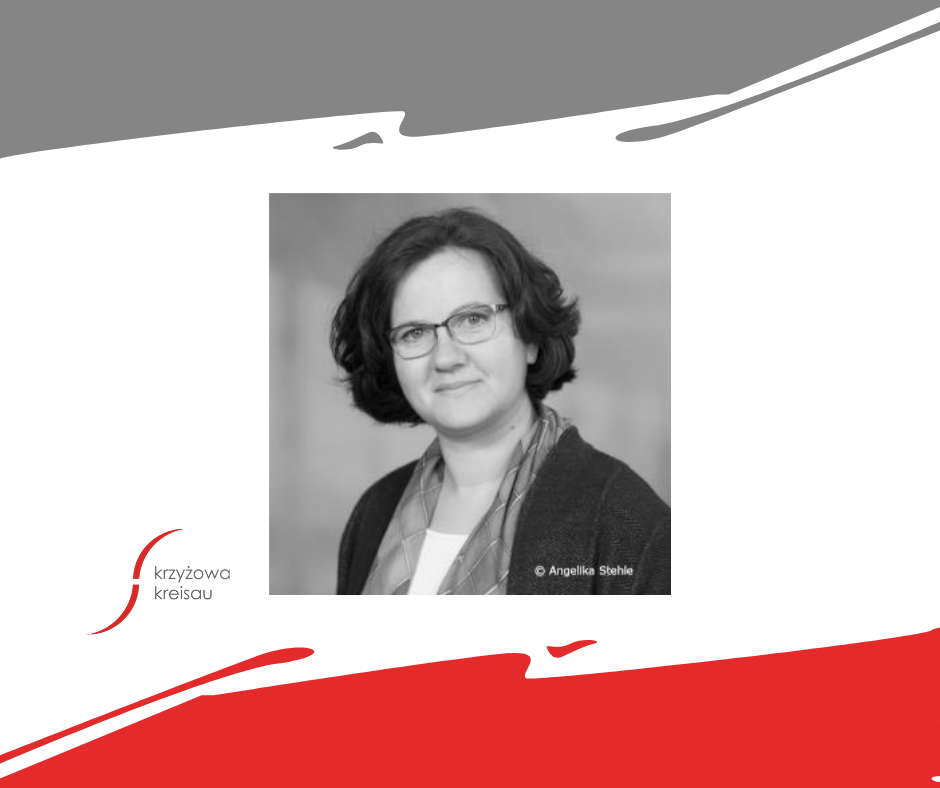 Urszula Pękala, Deputy Head of the Memorial Site, habilitated in Church History at the Faculty of Catholic Theology at the Johannes Gutenberg University in Mainz. The subject of her habilitation thesis is: "Between theology and national and political interests. Catholic bishops as actors of Franco-German and Polish-German reconciliation after World War II (1945-1990)".The scientific title of "habilitated doctor" was solemnly conferred on Urszula Pękala on January 31, 2022 after her public lecture on: "Church - nation - state. Faces of a complex relationship in a European context".
Urszula Pękala, Deputy Head of the Memorial Site, habilitated in Church History at the Faculty of Catholic Theology at the Johannes Gutenberg University in Mainz. The subject of her habilitation thesis is: "Between theology and national and political interests. Catholic bishops as actors of Franco-German and Polish-German reconciliation after World War II (1945-1990)".The scientific title of "habilitated doctor" was solemnly conferred on Urszula Pękala on January 31, 2022 after her public lecture on: "Church - nation - state. Faces of a complex relationship in a European context".
Urszula Pękala studied Catholic theology at the John Paul II University in Krakow. As a scholarship holder of the Konrad Adenauer Foundation, she obtained a doctorate in fundamental theology at the Albert Ludwig University in Freiburg im Breisgau (2010). In her doctoral thesis, she dealt with the theological foundations of interreligious dialogue. After her doctorate, she worked in an international scientific publishing house and was the editor-in-chief of the Catholic quarterly eSPe. Then she continued her research activities at the Institute of European History (IEG) in Mainz (2011-2020), where she headed an interdisciplinary research group dealing with the interactions between religion and politics in the process of Polish-German reconciliation, financed by the Polish-German Foundation for Science (2014–2020) 2016), and conducted research as part of a habilitation project financed by Deutsche Forschungsgemeinschaft (2017-2020).
Selected publications:
Monograph:
- Eine Offenbarung – viele Religionen. Die Vielfalt der Religionen aus christlicher Perspektive auf der Grundlage des Offenbarungsbegriffs Wolfhart Pannenbergs [One Revelation - Many Religions. The multiplicity of religions from the Christian perspective on the basis of the concept of Revelation by Wolfhart Pannenberg] (Bonner Dogmatische Studien, Bd. 48), Echter: Würzburg 2010.
Collective volumes:
- with Irene Dingel, Zmagania o pojednanie. Religia i polityka w stosunkach polsko-niemieckich po 1945 roku [The struggle for reconciliation. Religion and politics in Polish-German relations after 1945] translation. R. Żytyniec, Dom Wydawniczy Elipsa: Warszawa 2020.
- Ringen um Versöhnung II. Versöhnungsprozesse zwischen Religion, Politik und Gesellschaft [The struggle for reconciliation II. Reconciliation processes in religion, politics and society] (VIEG Beihefte 117), Vandenhoeck & Ruprecht: Göttingen 2019.
Articles:
- Dynamika pojednania. Polsko-niemieckie zbliżenie po II wojnie światowej [The dynamics of reconciliation. Polish-German rapprochement after World War II] in: Skonieczny, Tomasz (ed.), (Nie)Symboliczne pojednanie. Rozważania o relacjach polsko-niemieckich po 1945 roku, Wrocław 2019, pages 25-42.
- Versöhnungsasymmetrien. Die deutsch-polnische und die deutsch-französische Versöhnung nach dem Zweiten Weltkrieg [Reconciliation asymmetries. Polish-German and Franco-German reconciliation after World War II], in: Chylewska-Tölle, Aleksandra (ed.), Perspektiven eines Dialogs. Studien zu deutsch-polnischen Transferprozessen im religiösen Raum (Thematicon, Bd. 28), Logos: Berlin 2016, pages 83-99.
- Theologische Annäherungen an Auschwitz in Deutschland und Polen. Zwei Parallelwelten? [Theological approaches to Auschwitz in Germany and Poland. Two parallel worlds?], in: Chylewska-Tölle, Aleksandra; Heidrich, Christian (ed.), Mäander des Kulturtransfers. Polnischer und deutscher Katholizismus im 20. Jahrhundert (Thematicon, Bd. 22), Logos: Berlin 2014, pages 107-126.
- Ewolucja roli kobiety w Kościele w XX wieku: wnioski i kontrowersje [Evolution of the role of women in the Church in the 20th century: conclusions and controversies], in: „Aequalitas” 1 (2013), pages 1-17; http://aequalitas.ka.edu.pl/2012_v1/A_2012_vol_1_23_Pekala.pdf.
- Granice dialogu międzyreligijnego [The boundaries of interreligious dialogue], in: Kruszyńska, Sabina; Bembennek, Krystyna; Krupecka, Iwona (ed.), Dialog. Idea i doświadczenie, Wydawnictwo Uniwersytetu Gdańskiego: Gdańsk 2011, pages 257-267.



